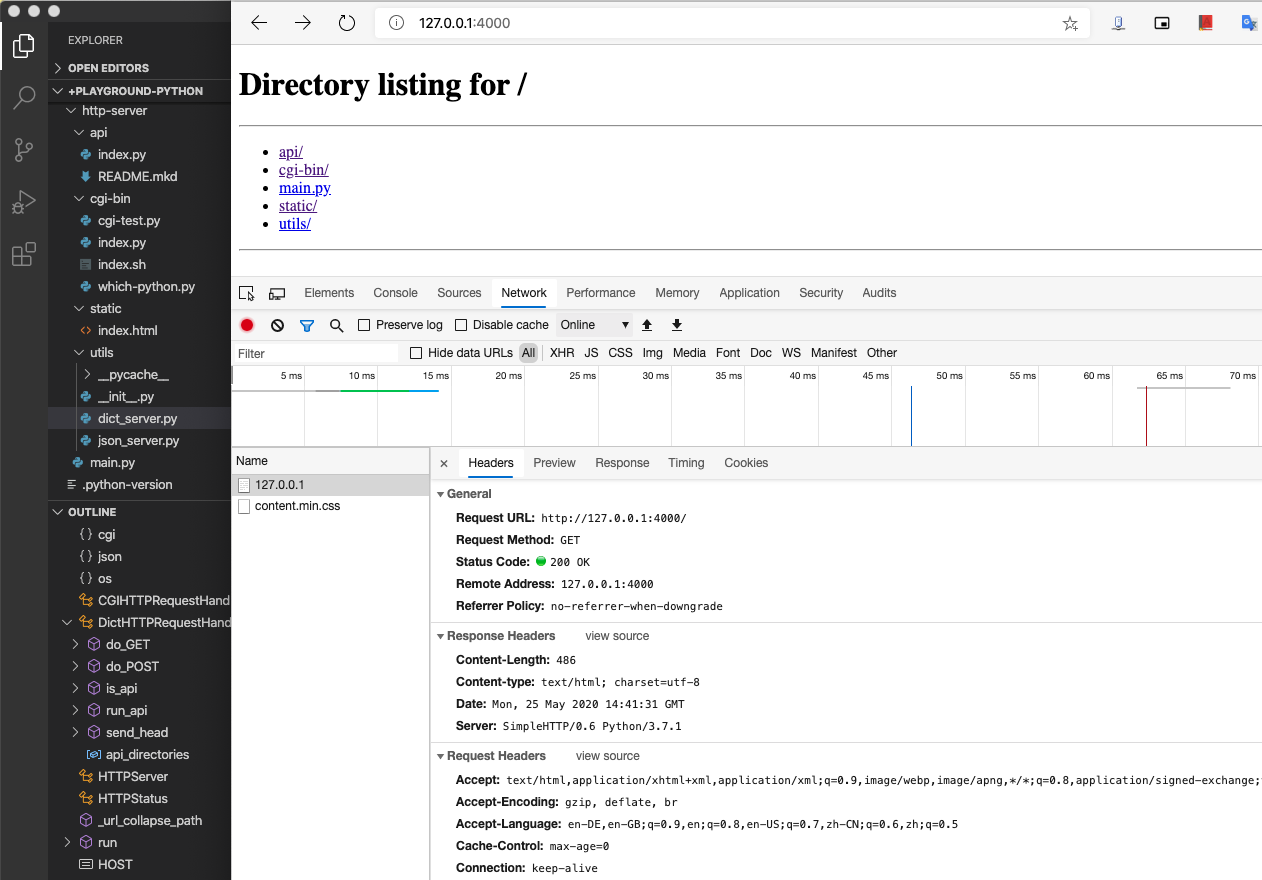A Summary of Simple Web Servers for Web Browser Application Development
- UUID: 229fb30d-afd2-409f-8696-39711fd6c405
- Status: Updated on 20211120
- Previous title: No.01 A Summary of Simple Web Servers for Frontend Development
References
- MDN > How do you set up a local testing server?, https://developer.mozilla.org/en-US/docs/Learn/Common_questions/set_up_a_local_testing_server
- Python Docs > HTTP servers, https://docs.python.org/3/library/http.server.html
Built-ins in Environments
PHP
.phpfiles can also be executed
php -S 0.0.0.0:5000
Python 3
python3 -m http.server
python3 -m http.server 5000
python3 -m http.server 0.0.0.0:5000
python -m http.server 5000 --cgi
# NOTE: New in version 3.4
python -m http.server 5000 --bind 127.0.0.1
# NOTE: New in version 3.7
python -m http.server --directory /tmp/
Python 2
python2 -m SimpleHTTPServer
python2 -m SimpleHTTPServer 5000
python2 -m SimpleHTTPServer 0.0.0.0:5000
DIY on Only A Few Lines of Code Required Web Frameworks
Python Flask
pip3 install flask
python3 simple-sever.py
Node.js Express
npm install express
node simple-server.js
Do It Yourself Example
A Web Server which Provides JSON Responses

# -*- coding: utf-8 -*-
# AUTHOR: Johann Huang ([email protected])
# DATE: 20200525
# REFERENCE: https://docs.python.org/3/library/http.server.html
# REFERENCE: https://www.tutorialspoint.com/python/python_cgi_programming.htm
# REFERENCE: https://gist.github.com/nitaku/10d0662536f37a087e1b
import os
import cgi
import json
from http import HTTPStatus
from http.server import HTTPServer, BaseHTTPRequestHandler
class JSONHTTPRequestHandler(BaseHTTPRequestHandler):
def do_GET(self):
"""Serve a GET request."""
self.send_response(HTTPStatus.OK)
self.flush_headers()
self.send_header('Content-type', 'application/json')
self.end_headers()
path = self.path
_uri, _, query_string = path.partition('?')
decoded_query_string = query_string.replace('+', ' ')
query_dict = {}
if decoded_query_string:
for parameter in decoded_query_string.split('&'):
key = parameter.split('=')[0]
value = True if '=' not in parameter else parameter.split('=')[1]
query_dict[key] = value
self.wfile.write(json.dumps(query_dict).encode('utf-8'))
else:
self.wfile.write(json.dumps({'error': 404, 'message': 'not found', 'path': path}).encode('utf-8'))
def do_POST(self): # NOTE: not tested, highly possibly not working
"""Serve a POST request."""
self.send_response(HTTPStatus.OK)
self.flush_headers()
self.send_header('Content-type', 'application/json')
self.end_headers()
ctype, _pdict = cgi.parse_header(self.headers.getheader('content-type'))
# refuse to receive non-json content
if ctype != 'application/json':
self.send_response(400)
self.end_headers()
return
# read the message and convert it into a python dictionary
length = int(self.headers.getheader('content-length'))
message = json.loads(self.rfile.read(length).decode('utf-8'))
# add a property to the object, just to mess with data
message['received'] = 'ok'
self.wfile.write(json.dumps(message).encode('utf-8'))
def run(host='', port=4000, handler_class=JSONHTTPRequestHandler, server_class=HTTPServer, *args, **kwargs):
server_address = (host, port)
httpd = server_class(server_address, handler_class)
print('MESSAGE: HTTPServer is listening at', server_address)
httpd.serve_forever()
if __name__ == "__main__":
# NOTE: empty also means every network interface, including loopback one, similar as '0.0.0.0'
HOST = '0.0.0.0'
PORT = 4000
run(HOST, PORT, JSONHTTPRequestHandler)
* cached version, generated at 2024-01-09 07:25:58 UTC.
Subscribe by RSS